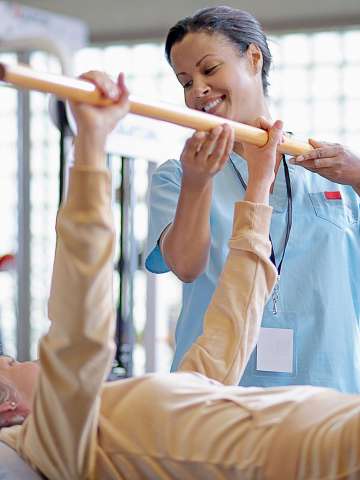Neuro-Rehabilitation
Our neuro-rehabilitation team offers comprehensive therapy to improve the quality of life for people with neurological disorders. Services include both outpatient and inpatient care.

UCLA Health excellence in neuro-rehabilitation
The experts at our Neuro-Rehabilitation Program aim to help minimize the symptoms and disabilities of people living with neurologic diseases. Our services include outpatient rehabilitation as well as inpatient rehabilitation through the California Rehabilitation Institute, the largest facility of its kind on the West Coast.
Highlights of our program include:
- Multispecialty care: Patients receive care from a full team of specialists, including rehab physicians and nurses, neurologists, psychologists, neuropsychologists, physical therapists, occupational therapists, recreational therapists and speech-language pathologists.
- Research focus: Our emphasis on research means we continually offer the newest, most effective rehabilitation therapies. Eligible patients may have access to new treatments by participating in clinical trials.
- Individualized treatment plans: We work with you to find realistic goals and effective treatments. Our specialists use a patient-centered approach, creating individualized care plans for each patient.
Our areas of care
So, what is neuro-rehabilitation, and what does the program entail? Our neurorehabilitation team provides a range of services, including:
- Inpatient care: Our 138-bed inpatient rehabilitation hospital is the largest of its kind in the western United States. A full team assesses symptoms and helps patients improve their daily functions. We create a care plan to address multiple issues, including swallowing, communication, mobility, pain and cognitive function.
- Outpatient care: We offer outpatient consultations for patients with new or existing neurologic diagnoses. Treatment plans aim to minimize the impact of disabilities associated with neurological disorders. They focus on improving functional abilities, self-care skills and independence. Patients discharged from our inpatient facility may transition to follow-up care through our outpatient facility.
- Research: Our team includes experts who continually seek the best treatment options. We bring these treatments to patients through studies and clinical trials. Our physicians research best practices in neuro-rehabilitation and adjust care plans in real time to offer effective solutions.
Conditions we treat
Our team treats a wide range of conditions that could benefit from neurological rehabilitation services, including:
- Guillain-Barré syndrome: A rare disorder in which the immune system attacks nerves, causing muscle weakness, tingling and possibly paralysis
- Multiple sclerosis: A chronic disease in which the immune system attacks the protective covering around nerves, often causing chronic pain, fatigue or vision loss
- Parkinson’s disease: A progressive nervous system disorder often causing tremors, loss of coordination or balance problems
- Spinal cord injuries: Any injuries affecting the spinal cord nerves and cells, which send messages between the brain and the rest of the body
- Stroke: A medical emergency in which blood flow to the brain is disrupted, often causing paralysis, speech and swallowing problems, memory loss and difficulty thinking
- Traumatic brain injury (TBI): Any injury causing brain damage, often after a blow to the head
Treatments we offer
We offer multiple types of therapy through the Neuro-Rehabilitation Program, including:
- Physical therapy: Physical therapists help improve muscle control and increase strength, balance and mobility.
- Occupational therapy: Occupational therapists help improve daily function and fine motor skills. They may recommend changes to the home environment or adaptive equipment to help increase a patient’s ability to care for themselves.
- Speech therapy: A speech therapist helps increase language and communication skills and improve swallowing problems.
- Recreational therapy: These therapists teach you adaptive skills to help you participate in leisure activities you enjoy, such as sports, gardening or crafts.
- Nutrition counseling: A nutrition counselor guides you regarding what foods can help optimize your nutrition during recovery. They may recommend specific diet plans, supplements or other modifications as needed.
Patients in our program may also have treatment plans that involve:
- Physiatry: A board-certified physical medicine and rehabilitation doctor oversees your care plan and refers you to specialists as needed.
- Psychology: Patients may participate in therapy to screen for or treat mental health disorders that arise from a neurological condition, such as depression or anxiety.
- Neuropsychology: A neuropsychologist evaluates how thoughts and behaviors relate to the brain and nervous system. They may help diagnose or manage neurological disorders, as well as help you cope with the changes you go through during rehabilitation.
Faculty

Emeritus Faculty
Contact us
Call 310-794-9551 for outpatient neuro-rehabilitation services or 424-522-7100 for inpatient neuro-rehabilitation services at UCLA Health.
Find your care
Our specialists provide extensive neuro-rehab services. For outpatient consultations call 310-794-1195. For inpatient services call 424-522-7100.






